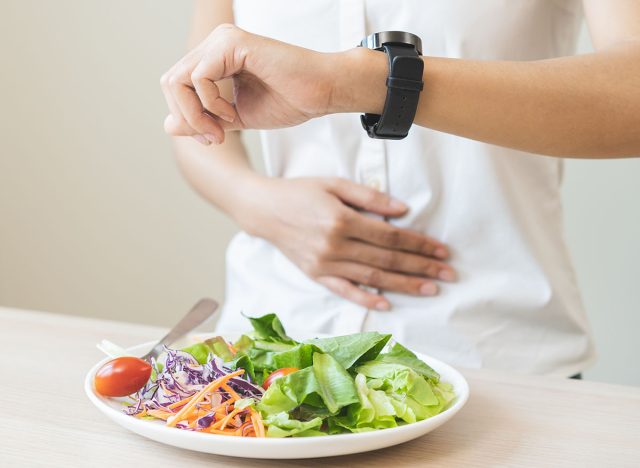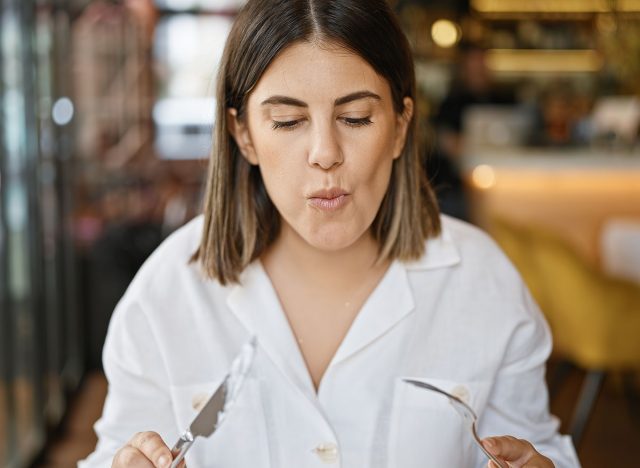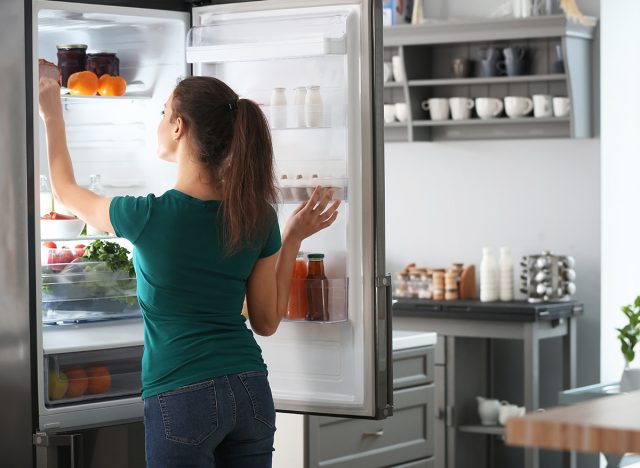Doctor Warns You to Stop Following These 10 Weight Loss Myths Right Now

There are so many weight loss myths on the internet. Which ones are true and which are false? Dr. Mikhail "Mike" Varshavski, DO, is a Board Certified Family Medicine Doctor living in NYC with 12.9 YouTube subscribers. In a new viral video, he explains that he is going to take some of the internet's most popular diet and fitness advice "and put it through a lie detector and find out what's true, what's not, and what's kind of in that middle ground," he says.
Myth 1: Black Coffee Boosts Metabolism
The first piece of advice? "Drink black coffee. This will boost your metabolism," he says in his pots. The truth? "Caffeine is a stimulant, so it could potentially boost your metabolism. But why I like this statement because black coffee doesn't have excess calories from sugar, milk, creamer, and all of that. In addition, black coffee will technically keep you fast going. So if you're a fan of intermittent fasting, you are still going to be getting a lot of those same benefits."
RELATED: The 9 Foods You Should Always Avoid on a Weight-Loss Diet
Myth 2: Hanging a Mirror in Front of Your Dining Table Will Help You Eat Less

The next? "Hang a mirror in front of your dining table. Studies show watching yourself reduces the amount of food you consume," he says. The truth? "If you want to hang a mirror in front of your dining table because of decor, please go right ahead. If you're doing it so you can hate yourself while you're eating, no."
Myth 3: Using Smaller Plates and Bowls Will Help You Eat Less

The third tip: "Use smaller plates and bowls to serve your own food," he says. "This is an optical trick that will give you a full sensation from seeing a clean plate. I like this tip. I think it's a fairly benign tip. Really, one of the biggest problems in the eating habits of my patients who are obese or overweight is that they eat really big portions, and they don't even realize it. So by having a smaller plate, you're already helping yourself to figure out a healthy portion size, but also,o when you see i,t and you eat the entire plate, there is a psychological concept to how you absorb those calories. It really does take effect."
Myth 4: Intermittent Fasting Will Help You Eat Less, But May Reduce Muscle Mass

Next, "Participate in intermittent fasting though it may also reduce muscle mass," he continues. "This is controversial for some like myself. Intermittent fasting works great because you're eating in a very specific window, meaning that you're not eating for 16 hours of the day, and you're only eating in a time-restricted eight-hour feeding pattern. You're going to eat less calories. That's just the nature of eating in a smaller window. That being said, some people actually have a disordered relationship with their eating habits when they do this type of fasting. So it's certainly not for everyone, but it is an option, and we've actually seen some favorable health effects outside of just weight loss. That includes hormonal changes, favorable hormonal changes, and increased clarity. Also, there's a genuine benefit to not eating for 16 hours of the day. It kind of gives you an advantage in being able to focus on exercise. Perhaps do a little mindfulness session, which can go a long way to calming you down and perhaps eating in your weight loss."
Myth 5: Replace High-Calorie Protein with Whey Protein Powder

Number five is to "replace your normal high-calorie protein intake with whey protein powder," he says. "This one I am hesitant to recommend to a lot of folks. I'm not a huge fan of getting my protein needs from supplements. When you eat a protein-rich meal, it usually comes with some fat, perhaps some carbohydrates, depending on the source of the protein. And when you're getting whey protein powder, you're really isolating the protein and getting just that. I feel like you can find nutrient-rich protein sources like tuna, like salmon, and in addition to the protein, you're also going to get a lot of other nutrients that aren't found on whey protein like Omega-3 fatty acids."
RELATED: I'm a Fat Loss Coach and Here Are 8 Non-Negotiables for Losing Weight Over 40
Myth 6: Chewing Slowly Will Trick Your Stomach Into Feeling Full

"Chew more slowly. Your brain can take time to signal to your stomach that you're full," is the sixth topic he tackles. "Being patient with how quickly you eat can allow your brain time to cut off before you overeat. I would change this advice just a little bit. I would say chew thoroughly because if you slow down your chewing, that might be a little bit awkward, but if you chew thoroughly, you could actually give yourself the time to signal to your body that you're fuller, that you're getting the nourishment that you need because it's really about eating to the point where you're satiated, not to the point where you feel so full that you hate yourself."
Myth 7: Spoil Food You May Be Tempted to Eat

"If you're trying to maintain a healthy weight, spoil food you don't want or need to eat" is number seven. If you have leftovers that are calling your name, find a way to ruin the food, such as dousing it in milk or pouring in a ton of salt," he says. "Not only will this create a very disordered eating pattern where you're destroying food instead of creating a healthy relationship with it, but you're also getting rid of food that someone can eat," he says, giving it "two thumbs down."
Myth 8: Drink Green Tea to Enhance Fat Burning

"Drink green tea. It's loaded with powerful antioxidants called catechins, which are believed to work synergistically with caffeine to enhance fat burning," is number eight. "I am one of the biggest green tea fans out there. It's important to know that it has caffeine in it, so ideally, it is not a great drink to drink at the end of the day, but green tea is a great option for lunch or breakfast. Not only does it have catechins, it has polyphenols in it, Altheine, which sort of balances out the boost that you get from the caffeine stimulant, but also gives you that calming effect on your mind," he says. "Now, whether or not green tea will actually boost weight loss, it's not gonna be a magical effect that you see here."
Myth 9: Interval Training Burns More Fat

Nine is that interval training, "short bursts of intense exercise, followed by longer stretches of mild exercise," burns more fat. He explains that this is his favorite type of HIIT exercise. "You go all out for 30 seconds or a minute, and then for a minute, three minutes, five minutes, you do really mild light intensity activity. One, it promotes weight loss. Two, it promotes muscle building. Three: it also improves heart rate variability. When you start exercising really quickly and you go full-on intensity, your heart rate should go up to compensate. But then, when you do light-intensity exercise, your heart rate should be able to settle back down. As you do this more and more, your heart's ability to calm down in that period of light intensity will improve. And what we've actually seen in scientific research is improved survival in individuals who were having heart attacks. If they had good heart rate variability, it would be a true survival benefit."
RELATED: 8 Tips to Make Losing Weight Feel Effortless, From Proven Experts
Myth 10: You Need to Be Hungry to Lose Weight

As for ten, "Get used to and accept the feeling of being hungry. You can't lose weight without enduring hunger, so recognizing and normalizing that feeling is important," he says, revealing that this is simply not true. "You can lose weight without necessarily ever feeling hungry and suffering with it. Intuitive eating is something that many of my patients have done quite well. Actually, you only eat to the point where you're no longer hungry, where you feel satiated but not overly full. That way, you're not overeating calories, you're not having these tremendous portions of unhealthy foods, and you don't have to sit and starve yourself." And if you enjoyed this article, take advantage of these 15 Quick Ways to Lose Body Fat Percentage in a Week.




